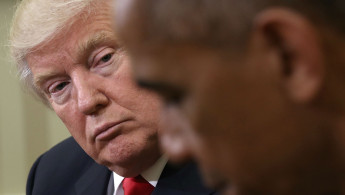White House backs Russia probe against defiant Trump
The White House and leading senators stood against President-elect Donald Trump on Monday opposing his calls for a Congressional investigation into US intelligence that Russia interfered to sway last month's election.
The row has pitted the incoming Republican president, who has never previously held elective office, against influential senators on both sides of the aisle, the Central Intelligence Agency and now the outgoing Democratic White House.
US media has reported for days on secret CIA findings that Moscow sought to bolster Trump's election bid, against Democratic former secretary of state Hillary Clinton, by releasing hacked Democratic Party documents.
Trump has called the findings "ridiculous," dismissing them as an effort by Democrats to refight an election that they lost against opinion poll odds.
"We have long supported the principle of congressional review of this matter," said White House spokesman Josh Earnest, saying one was "certainly warranted."
"You didn't need a security clearance to figure out who benefited from malicious Russian cyber activity," Earnest added.
But a defiant Trump on Monday again rejected the CIA conclusions.
"Can you imagine if the election results were the opposite and WE tried to play the Russia/CIA card. It would be called conspiracy theory!" the president-elect tweeted before another day of cabinet-building talks.
"Unless you catch 'hackers' in the act, it is very hard to determine who was doing the hacking. Why wasn't this brought up before election?"
The Kremlin dismissed the reported CIA assessment as "absolutely unfounded, unprofessional, amateur accusations that have nothing to do with reality."
'Not our friends'
A Trump transition spokesman told reporters it was "an attempt to try to delegitimise president-elect Trump's win"
But Republican and Democratic senators insisted there were serious indications Russia had sought to undermine the US democratic system, and called for a bipartisan probe.
Republican Senator John McCain told CBS television that there was "no doubt" about the hacking.
"It's another form of warfare and the entire issue is going to be examined by the Armed Services Committee because it's a threat to our national security," he said.
Mitch McConnell, the powerful Senate majority leader whose wife Elaine Chao is Trump's transportation secretary nominee, said the issue should be handled by the Senate Intelligence Committee.
"The Russians are not our friends," he said.
The incoming president has called for closer ties to Moscow, perhaps at their worst since the end of the Cold War, in contrast to received wisdom in Washington that Russia remains a global security threat.
US intelligence previously linked Russia to damaging email leaks from the Clinton campaign but saw it as a broad bid to undermine confidence in the US political process.
On Friday, however, the Washington Post reported that the CIA has since concluded that the aim of the cyber intrusions was to help Trump win.
The report came on the heels of President Barack Obama's order to review all cyber-attacks that took place during the 2016 election cycle amid growing calls from Congress for more information on the extent of Russian interference.
Trump-CIA rough start
Trump's rejection of the CIA conclusions signals a likely rough start to relations between the White House and the spy agency when the president-elect takes office on January 20.
"He believes that the CIA is a political institution and he's going to have to learn that it's not. It is apolitical," former deputy CIA director Michael Morell told the 'CBS This Morning' show.
Trump has also come under fire for reportedly agreeing to one intelligence briefing a week, instead leaving vice president-elect Mike Pence to get the more customary daily briefing.
Cybersecurity experts rebuffed Trump's assertion that the source of the hacks was not clear.
Dmitri Alperovitch, whose Crowdstrike firm detected the Russian intrusion at the Democratic National Committee in May, said in a tweet that his company was "able to watch everything they (the intruders) did for weeks."
"They were caught in the act," added Matt Tait, another expert.





 Follow the Middle East's top stories in English at The New Arab on Google News
Follow the Middle East's top stories in English at The New Arab on Google News
![The UAE is widely suspected of arming the RSF militia [Getty]](/sites/default/files/styles/image_330x185/public/2024-11/GettyImages-472529908.jpg?h=69f2b9d0&itok=Yauw3YTG)
![Netanyahu furiously denounced the ICC [Getty]](/sites/default/files/styles/image_330x185/public/2024-11/GettyImages-2169352575.jpg?h=199d8c1f&itok=-vRiruf5)
![Both Hamas and the Palestinian Authority welcomed the ICC arrest warrants [Getty]](/sites/default/files/styles/image_330x185/public/2024-11/GettyImages-2178351173.jpg?h=199d8c1f&itok=TV858iVg)